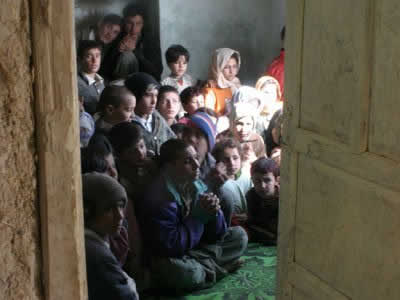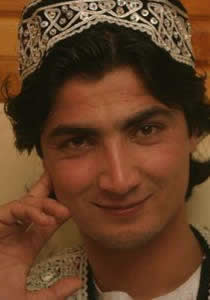After 30 years of war and Taliban-rule, pop culture has returned to Afghanistan. Afghan Star – a Pop Idol-style TV series – is searching the country for the next generation of music stars. Over 2000 people are auditioning and even three women have come forward to try their luck. The organizers, Tolo TV, believe with this program they can ‘move people from guns to music’. Afghan Star, a documentary film, follows the three month process from the regional auditions to the final in Kabul. Behind the scenes at all times we gained unprecedented access to the lives of contestants, fans and producers alike.
Lima, a 25 year old from Kandahar faces a very different experience. Coming from one of the most traditional and religious areas in the country, Lima fears for her life every time she goes home. Her music teacher smuggles instruments into the house and they practice in secret. She says she has no choice but to sing and face the consequence. She is poor and the $1000 prize is her only future.
But the main story belongs to Setara, a 21 year old singer from Herat. Wearing modern fashion, Bollywood makeup and sometimes moving on stage made her a controversial figure: adored by the young girls, hated by the older generations. When she finally dances on stage  and lets her headscarf slip, well, all hell breaks lose…
and lets her headscarf slip, well, all hell breaks lose…
Afghan Star is Havana Marking’s first feature documentary, shot over the 4 months in Kabul. She has produced TV docs (both factual entertainment and one-off polemics) for over 10 years now, although directing is relatively new to her: before AS she directed The Crippendales (2007)– a 30min film about the first troupe of disabled strippers winning the Channel 4@Sheffield scheme for New Talent. In 2005 she made the Great Relativity Show, a series of animated shorts (3MW) that explained the Theory of Relativity. These won a Pirelli Science award.
Bijan Tehrani: How did you come across the subject of Afghan Star?
Havana Marking: I was trying to find a way to go to Afghanistan, I’ve always wanted to go but it was forbidden as it wasn’t safe. I knew there was no point in going there unless there was a film for me to make that was interesting enough or different enough and that would give a representation of the silent majority… and then I spoke to a journalist who told me about Afghan Star and I knew instantly that it was a great way to get into the heads and hear the voices of the young people there.
BT: How challenging was the making of the film?
HM: Afghanistan is a dangerous place, there are random bombs explosions and kidnap threats – ransoms have become a valid income in a country that’s incredibly poor. So you have to keep your crew as small as possible, try not draw attention to yourself and make sure you stay low-key. I did have a bodyguard who was great and made everyone feel safe. The kidnap threat made it so that you were not telling anyone in advance what you were going to do and where you were going to be. I was used to TV where you organize everything in advance so in the beginning, I was a bit freaked out by this change but it ended up being absolutely liberating. You follow the action as it happens. You show up somewhere and if it doesn’t work out, you sip tea and chat away and wait for the right people to come along. In the end, this situation probably added to the energy and heart of the film.
BT: How you managed to have, Setara and Lima, the two women in your film to trust you and let you in their personal lives? HM: I knew right from the beginning that I was going to follow those two and get to know them. The main thing about filming women in Islamic nations is not that they’re uncomfortable on camera; they fear that by filming them you might compromise their honor. The judgment on whether you will do that or not is based on getting to know you, how you behave and the sort of questions you ask. I am used to traveling and being in Islamic countries so after some time you get used to the etiquette and you learn how to behave in a respectful manner, but it’s learning those little things that make a difference, of what’s appropriate and what isn’t.
HM: I knew right from the beginning that I was going to follow those two and get to know them. The main thing about filming women in Islamic nations is not that they’re uncomfortable on camera; they fear that by filming them you might compromise their honor. The judgment on whether you will do that or not is based on getting to know you, how you behave and the sort of questions you ask. I am used to traveling and being in Islamic countries so after some time you get used to the etiquette and you learn how to behave in a respectful manner, but it’s learning those little things that make a difference, of what’s appropriate and what isn’t.
BT: How important is this Afghani version of American Idol, Afghan Star, in Afghanistan? Is the show still running there?
HM: Yes, it’s still going on; Afghan Star is in its fourth season now. For us, it was a stroke of luck to film when we did. The first season was more of a practice run so it did not look that good as a show. The second season was getting more established and the audience was getting used to it, by word of mouth and everything. The season we filmed, the third one, was when it took off, and in the process became controversial. Ironically, season 4 was already established so it stirred less controversy because people had gotten used to the idea
BT: Your film is not so much about the competition as the situation of women in Afghanistan. How did the women in the film react to the finished film?
HM: Both of them haven’t seen the film. Setara should be able to see the film when I go back in August. Lima has now moved back to Pakistan so it’s impossible to get in touch with her. I’ll see what Setara says in August.
BT: How has the reaction been with Afghani women?
HM: With the Afghani women who’ve seen it here, it’s been incredible. There have been screenings with the refugee council in London, or some in Toronto where there’s a big Afghani community. After some screenings, I’d be surrounded by 10 Afghani girls thanking me; it was really unexpected and exciting.
Afghan Star will not be shown in Afghanistan. Mainly because many of the characters would not have been in the film if they thought it was to be on television there.
BT: Any new projects in the same part of the world?
HM: City elections are coming up soon, we might do something on it. We also have a project about midwives there… nothing at the moment for features. I have ideas for other projects but they’re not in Afghanistan.

